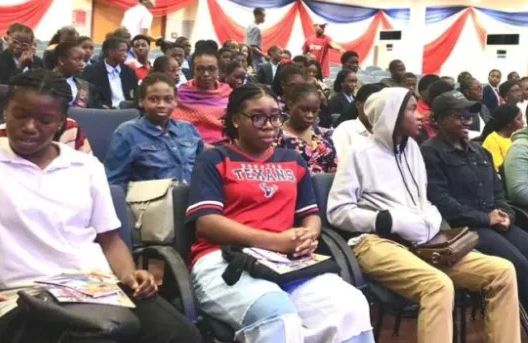Connect with us
Published
1 week agoon
By
dplanatenews
The United States Embassy in Nigeria has once again reiterated its commitment to strengthening educational ties between Nigeria and the U.S. by encouraging Nigerian students to explore study opportunities in America. This call comes at a time when thousands of young Nigerians are seeking quality education abroad, global exposure, and career pathways that can set them apart in an increasingly competitive world.
With its robust academic institutions, diverse cultural environment, and reputation as a leader in innovation and research, the United States remains one of the top destinations for Nigerian students. The Embassy’s message underscores the importance of education not only as a tool for personal development but also as a bridge for cultural exchange and international collaboration.
In this article, we will explore the details of the Embassy’s statement, highlight the benefits of studying in the U.S., outline available opportunities, and provide guidance for Nigerian students who aspire to further their education in America.

The United States is home to some of the world’s best universities, with names like Harvard, MIT, Stanford, and Yale topping global rankings year after year. However, beyond these Ivy League schools, the U.S. has over 4,000 accredited institutions that cater to a wide range of academic and career interests.
For Nigerian students, the attraction lies in:
The U.S. Embassy’s call to Nigerian students goes beyond highlighting academic excellence. It stresses the role of education in nation-building and the opportunities for cross-cultural exchange. Nigerian students studying in America often act as ambassadors of their country, building networks that foster diplomacy, business partnerships, and cultural understanding.
The Embassy emphasized that pursuing education in the United States is not just about securing a degree but about gaining an international perspective—something increasingly valuable in today’s interconnected world.
One of the major concerns for Nigerian students is the cost of studying in America. Tuition fees and living expenses can be daunting, but the U.S. offers various funding options:
The Embassy urged students to take advantage of these resources, noting that financial barriers should not discourage talented Nigerians from pursuing their dreams.
As part of its educational outreach, the U.S. Embassy highlighted EducationUSA, a U.S. Department of State program that provides free and accurate information about studying in America. In Nigeria, EducationUSA operates advising centers in Lagos, Abuja, and other regions.
Through these centers, Nigerian students can access:
This resource has helped thousands of Nigerians successfully transition to U.S. schools and remains a critical tool for anyone considering this path.
A major talking point in Nigeria’s educational discourse is the issue of brain drain—the migration of talented individuals to foreign countries. However, the Embassy framed its call as a way of encouraging brain gain.
Students who study abroad often return with enhanced skills, global networks, and experiences that can drive innovation and development back home. Furthermore, many establish international collaborations that benefit both Nigeria and the United States in areas such as business, healthcare, and technology.
While opportunities abound, Nigerian students also encounter challenges when trying to study in America:
The U.S. Embassy reassured students that with proper planning, guidance, and resilience, these challenges can be overcome.
To increase their chances of success, Nigerian students are encouraged to:
Over the years, many Nigerians who studied in the U.S. have gone on to achieve greatness in various fields:
These examples illustrate how American education has propelled Nigerians to global relevance.
The Embassy’s message reflects a growing trend of collaboration between Nigeria and the U.S. in education. With Nigeria’s population expected to surpass 400 million by 2050, investing in the education of its youth is critical. The U.S., with its world-class institutions, remains a natural partner.
The Embassy concluded its statement by encouraging students not to see studying in the U.S. merely as an escape but as an opportunity to equip themselves with the knowledge and skills to contribute meaningfully to Nigeria’s development.
